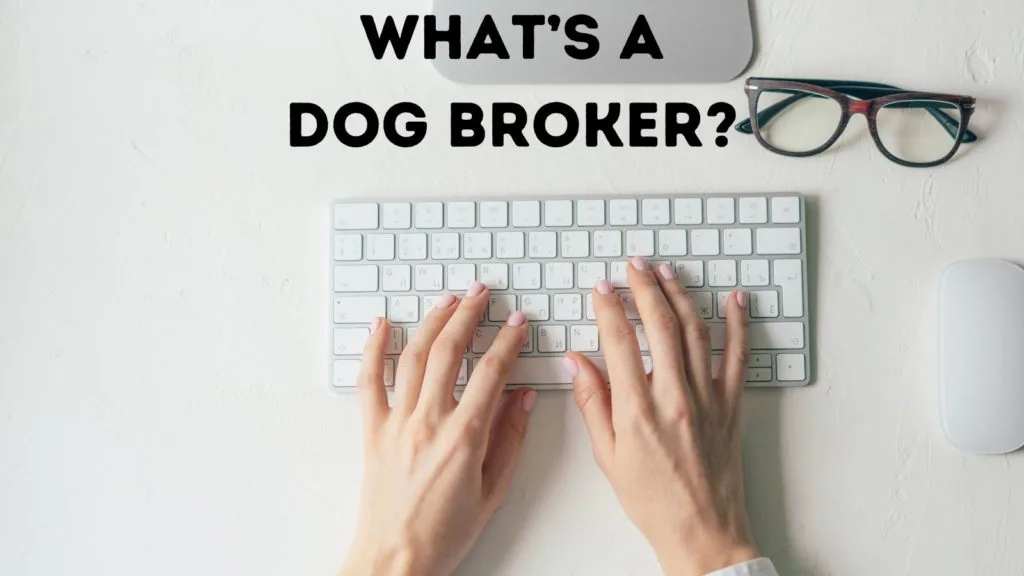You’re searching for Aussiedoodles and suddenly come across a very slick website–that has so many puppies of all breeds. You very well may have run across what’s known as a “dog broker.” While the term might sound benign, the role they play in the pet industry is often controversial and can be problematic. Let’s look at what dog brokers are, how they operate, and the reasons why potential dog owners should be cautious about acquiring a pet through them.

What is a Dog Broker?
A dog broker is an individual or business that acts as a middleman between dog breeders and buyers.
They do not breed dogs themselves; instead, they source puppies from various breeders and sell them to pet stores, online customers, or directly to buyers–often on beautifully built websites that rank high in online searches.
Dog brokers are essentially the wholesalers of the dog world, buying and selling puppies for profit.
How Do Dog Brokers Operate?
- Sourcing Puppies: Dog brokers obtain puppies from a variety of sources, including commercial breeding facilities, commonly known as puppy mills, and sometimes from smaller, possibly more legitimate breeders but also potentially backyard breeders.
- Selling to Pet Stores: Many puppies sold in pet stores come from dog brokers. These brokers facilitate the logistics of transporting puppies from breeders to stores.
- Online Sales: Some brokers operate through websites, offering a wide range of breeds and arranging for the transport of the puppy to the buyer.
Brokers should be licensed through the US Department of Agriculture with a Class B license:
A Class B license is issued to other dealers whose business includes the purchase and/or resale of warm-blooded animals. Examples of dealers include commercial dog-breeding facilities, animal brokers, and operators of auction sales.
Why You Don’t Want to Use a Dog Broker
You want to either find an Aussiedoodle at a responsible breeder who is passionate about the dogs or a rescue. Dog brokers need to be avoided for several reasons:
- Lack of Transparency: When you buy a puppy through a broker, it’s often difficult to get accurate information about the puppy’s origin, health, and breeding conditions. This lack of transparency is a significant concern.
- Supporting Unethical Breeding: Many brokers source puppies from puppy mills, where dogs are bred in poor conditions with little regard for their health or well-being.
- Health Issues: Puppies from brokers are more likely to have health and behavioral problems due to poor breeding practices and the stress of transport at a young age. Without transparent information on a puppy’s background, new owners risk inheriting unknown health problems that can lead to heartache and high veterinary bills.
- No Accountability: If health or behavioral problems arise, brokers often do not offer the same support or guarantees that a responsible breeder or a rescue organization would provide.
- Higher Prices: Brokers add a markup to the price of the puppies they sell, often making them more expensive than buying directly from a reputable breeder or adopting from a shelter.
- Lack of Breed Expertise: Brokers are salespeople and may lack the specific breed knowledge that dedicated breeders possess.
Tips for Finding a Reputable Source
Identifying whether a website belongs to a dog broker rather than a legitimate breeder can be crucial in ensuring ethical practices and the health and well-being of the dogs. Here are key indicators to help distinguish between a broker’s website and a breeder’s website:
- Lack of Specific Information About Each Dog: Brokers often have multiple breeds available and may not provide detailed information about each dog’s health, temperament, and breeding history.
- Multiple Breeds Available: If the website offers a wide variety of breeds, especially popular or ‘trendy’ ones, it could be a sign of a broker, as breeders usually specialize in one or just a few breeds.
- Emphasis on Shipping: If the website focuses heavily on the ease of shipping dogs to new owners rather than encouraging personal pickup, it might be a broker’s site.
- High Volume of Puppies: A constantly available, large number of puppies can be a sign of a broker, as ethical breeders often have waiting lists and breed dogs in smaller numbers. A reputable breeder will only have puppies a few times a year and will generally have a waitlist.
In summary, while a broker’s website might focus on the transactional aspect of acquiring a dog, a breeder’s website tends to emphasize the care, health, and lineage of the dogs, along with a more personal and informative approach. Always do thorough research and due diligence when looking to get a puppy, to ensure you are supporting ethical breeding practices.
By avoiding dog brokers and choosing either reputable breeders or adoption from shelters and rescues, potential dog owners can ensure that they are not supporting the inhumane treatment of animals, reducing the risk of health and behavioral issues, and making a more informed and ethical choice for their new best friend.
- What’s an Unfurnished Aussiedoodle? - December 14, 2024
- 500+ Aussiedoodle Names - July 29, 2024
- Does Your Breeder Do Puppy Socialization? - July 9, 2024
